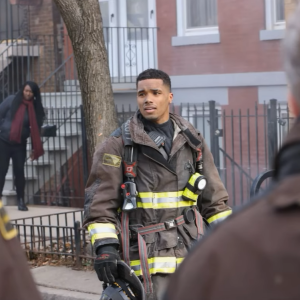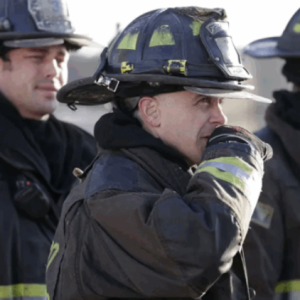For more than a decade, Chicago Fire has thrived on the strength of its ensemble cast, but there has always been one figure whose presence anchored the show in a way that was both commanding and deeply human—Chief Wallace Boden, portrayed by the incomparable Eamonn Walker. Now, after twelve unforgettable seasons, the news of Walker’s departure has sent shockwaves through the fandom, leaving fans grappling with the loss of a character who was not just a leader on screen but also the moral heartbeat of Firehouse 51. From the very first episode, Boden established himself as more than just a chief; he was a mentor, a father figure, and at times, the conscience of the entire One Chicago universe. His departure marks not only the end of an era but also the beginning of a period of uncertainty for a series that has always leaned heavily on his steady hand. Fans have flooded social media with tributes, ranging from heartfelt messages of gratitude to raw expressions of disbelief, reflecting just how intertwined Boden’s journey has become with their own emotional investment in the show.
Eamonn Walker’s portrayal of Chief Boden was defined by a rare blend of authority and vulnerability. He commanded respect without ever having to demand it, and his leadership was never just about issuing orders—it was about listening, understanding, and guiding his team through the darkest of moments. Whether he was standing in front of a burning building or sitting across from a firefighter wrestling with personal demons, Boden carried a presence that was larger than life yet profoundly relatable. Walker infused him with humanity, reminding viewers that leadership is not about perfection but about integrity, compassion, and the willingness to make sacrifices. Over the years, we saw Boden battle political pressures within the department, navigate devastating personal losses, and consistently put his team above himself, creating some of the most emotionally powerful arcs in the series. His evolution from a tough, battle-hardened veteran to a deeply empathetic leader mirrored Walker’s own growth in the role, solidifying Boden as one of television’s most compelling characters. His exit, therefore, is not just a loss for the show—it is the departure of a legend whose shadow will loom large over every scene to come.
The decision for Walker to step away after twelve seasons, though heartbreaking for fans, is not entirely surprising. Long-running television shows inevitably face the departure of their foundational players, and for an actor of Walker’s caliber, the call to explore new creative opportunities is understandable. While the official details surrounding his decision remain limited, speculation abounds: some suggest he is seeking fresh acting challenges, others believe he wishes to focus on personal projects, while many simply acknowledge that twelve seasons is a monumental commitment for any performer. Walker himself has spoken about how deeply he connected with Boden, describing the role as one that allowed him to explore themes of leadership, sacrifice, and family in ways that resonated profoundly with him. His farewell, therefore, is bittersweet—it is the conclusion of a chapter that defined his career and elevated Chicago Fire into something more than just a procedural drama. But it is also the beginning of a new journey, one where fans will undoubtedly follow him with the same loyalty they’ve shown his character.
Boden’s absence will reverberate through the halls of Firehouse 51 in ways that will redefine the show’s future. For years, he was the stabilizing force in a firehouse that has endured countless tragedies, departures, and conflicts. Without him, the team faces a leadership vacuum that will be as emotionally challenging as it is narratively compelling. The question of who steps into his role is one that will shape the dynamics of the upcoming seasons—will it be an existing member of the firehouse like Stella Kidd, who has proven her mettle as a leader, or will a new face be introduced, risking disruption to the chemistry fans have cherished for years? Beyond the practical shift, there is the emotional fallout to consider. Characters like Kelly Severide, Stella, and Herrmann, all of whom leaned on Boden’s wisdom in times of crisis, will now have to find their own footing without their mentor. The grief of losing him, even if not through death but through departure, will offer the show rich material to explore, testing the bonds of Firehouse 51 and challenging the team to honor his legacy by carrying his lessons forward. For viewers, however, the transition may feel like a betrayal of stability, a reminder that even in a fictional firehouse, nothing lasts forever.
And yet, despite the heartbreak, there is solace to be found in the legacy Eamonn Walker leaves behind. His portrayal of Chief Boden will forever be remembered as the soul of Chicago Fire, a performance that elevated every storyline and provided audiences with a leader they could admire, respect, and love. Tributes from his co-stars and the show’s creators highlight not only his talent but also his generosity as a colleague and mentor off-screen, qualities that mirrored the very character he brought to life. Social media continues to light up with gratitude, fans sharing clips of Boden’s most iconic moments—his stirring speeches, his moments of quiet vulnerability, his fierce defense of his crew—as a collective farewell to a character who defined the heart of the series. Walker’s departure is, without question, a seismic shift for Chicago Fire, one that will reshape its identity moving forward. But it is also a celebration of everything he gave to the role: twelve seasons of unforgettable storytelling, a character who will forever stand as a symbol of leadership and family, and a legacy that ensures Chief Wallace Boden will never truly leave Firehouse 51. As the show embarks on its next chapter, fans will carry Boden’s lessons with them, a reminder that even when the chief steps away, his spirit continues to burn as brightly as the flames his team fights every day.





